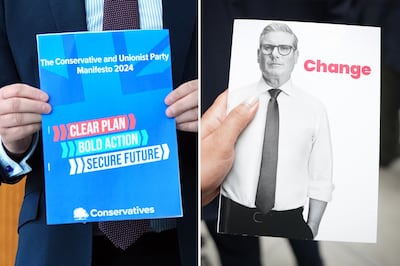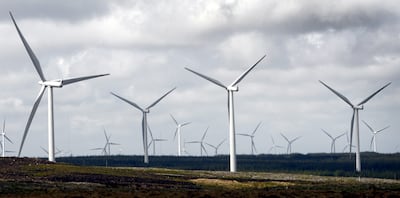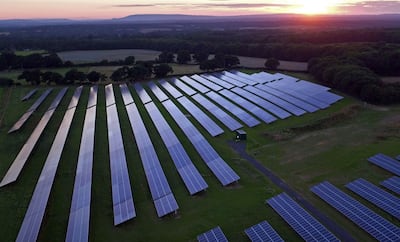Industry leaders says Starmer government must not be half in and half out of commitments to progress on renewables

Tim Stickings LondonListen In EnglishListen in ArabicPowered by automated translation

Solivus is just the sort of company that fits into Labour’s plans to boost the UK’s economic growth through investment in clean technologies.
It puts lightweight solar panels on large buildings like aircraft hangers and sports stadiums, reducing their reliance on the electricity grid, while feeding excess energy back into it.
It is a simple way of generating renewable energy, but trading it or getting it to the electricity grid is fraught with tariffs and planning issues.
Innovative start-ups like Solivus are hoping a Labour government, should one be voted into power this week, would be in a position to address such issues.
Read MoreUK urged to increase wind farm manufacturing or fall behind in quest for net zero
No green, no growth
Business lobby group the Confederation of British Industry (CBI) said on Monday that the next government cannot be pro-growth without being pro-green and warned of the risks of trying to “separate the economy from net zero”.
“There is still too much in our political discourse that amounts to ‘can we afford to go for net zero?’ But the real question is: can we afford not to?” the CBI’s chief executive, Rain Newton-Smith, said.
“The hit to our GDP will be five times higher if we don’t act, than if we act early.
“But there is another cost on top of all that – the cost of falling behind in the global race for cheaper, more reliable, more efficient energy.”

Jo Parker-Swift, the chief executive of Solivus at Reset Connect London, part of London Climate Action Week. Matthew Davies / The National
Manifesto promises
The Labour Party’s campaign manifesto claims that for every £1 of public investment in green, net-zero and decarbonising projects, a Labour government would expect to unlock £3 of private investment.
The manifesto itself shows an intent to spend £7.3 billon on these projects over the next parliament, divided up between steelmaking (£2.5 billon) gigafactories for electric car batteries (£1.5 billon), decarbonising ports (£1.8 billon), carbon capture (£1 billon) and green hydrogen (£500 million).
There are also commitments to fully decarbonise the electricity grid by 2030, a target that will be reached by quadrupling offshore wind capacity, trebling solar capacity and a doubling of onshore wind capacity.
The Conservatives’ manifesto talks of an “affordable and pragmatic transition” that will “cut the cost of tackling climate change”. The Labour manifesto speaks of the “huge opportunity” that the road to net zero presents in terms of jobs and boosting economic activity.

The Conservative and Labour party manifestos. PA
The big question is where will all the billions come from, and while the Institute for Government think tank calculates that Labour’s pledges are fully funded, it points out that the manifesto “is clear a Labour government will borrow to raise some of the funding for its green prosperity plan”.
But last week a recording of Labour’s shadow chief secretary to the Treasury emerged in which he said the £28 billion a year that was originally meant for the party’s green spending plans was in effect a “tiny” amount and that “hundreds of billions” of pounds would be needed to get to net zero.
In the recording, which was made some months ago, Darren Jones said that when Labour leader Keir Starmer reduced the £28 billion annual spend figure to £4.7 billion, it may have seemed that the party had “basically junked the whole thing but we definitely haven’t”.
As the leak led to yet more scrutiny of Labour’s green spending plans, the party said the “hundreds of billions” Mr Jones was referring to related to private sector investment, rather than taxpayer-funded government spending.

Darren Jones. shadow chief secretary to the Treasury. Photo: House of Commons
Great British Energy
The cornerstone of Labour’s net zero strategy and key to making the UK a “clean energy superpower”, is Great British Energy, a publicly-owned company that will put money into decarbonising projects alongside private investors.
“The concept of Great British Energy is very important, in terms of making sure there is absolute focus on making sure there is investment in zero carbon,” Juliet Davenport, the president of the Energy Institute, told The National.
“The idea of having an overall energy strategy, which to be frank we haven’t had before – we’ve had bits and pieces of it – is important, because you will not fix the energy system by just tinkering with one bit or another. You have to look at it as a whole and you have to move the whole thing forward.”
To move GB Energy forward, Labour has pledged to inject £8.3 billon into it within the next parliament.
Some of the proposed elements in GB Energy do echo the Net Zero Strategy that was put forward during Boris Johnson’s tenure as prime minister.
Nonetheless, recent polling by the More in Common think tank showed that around 63 per cent of the British public were in favour of setting up GB Energy, even though most did not think it would lead to a reduction in their bills. Nearly half of those polled feared it would lead to higher taxes.

A new UK government needs to introduce tax changes and a 'presumption in favour of renewable energy' in planning rules, according to Power Generation Network. PA
No growth, no net zero
Much of Labour decarbonisation plans depend on the UK’s economic growth accelerating, and the argument is you cannot have one without the other.
A dim light shone at the end of a very long tunnel for the next government on Friday in terms of revised GDP figures – the Office for National Statistics announced that UK GDP in the first quarter of 2024 had risen by 0.7 per cent, up from an initially calculated 0.6 per cent.
“The revision suggests that real GDP growth in 2024 as a whole may be more likely to come in a bit above our existing forecast of 1.0 per cent,” said Paul Dales, chief UK economist at Capital Economics.
The theory is the better the British economy recovers, the more can be invested into green strategies by the next government, which itself should engineer more economic growth.
But the stark realities of weighing public spending with raising taxes and increasing borrowing will greet the next government on day one after this week’s election.
Nonetheless, Labour is adamant that if it is to form the next government, it will continue to prioritise climate policy.
“Under Rishi Sunak we have backtracked on our climate commitments globally and squandered our leadership role, and so if we do get over the line, the first thing is leadership,” shadow foreign secretary David Lammy told diplomats at London Climate Action Week.
“I think it’s hugely important that if we have the privilege to serve, the Labour Party is in a leadership position once again and putting the UK in a leadership position.”
100-day plan
Bosses in the clean power sector have drawn up a list of policies they want to see in the first 100 days of a new government.
They included lifting an effective ban on onshore wind farms and relaxing rules on solar panels in homes and gardens.
The demands by a group called the Power Generation Network also include tax changes and a “presumption in favour of renewable energy” in planning rules.
Dan McGrail, the chief executive of Renewable UK, said ministers should consider handing some local planning powers to energy sector experts.
Over the five years of a new parliament, the priority should be to build out Britain’s power grid “at scale”, Mr McGrail said.

Labour wants to treble solar capacity as part of its target to fully decarbonise the electricity grid by 2030. PA
Grid upgrade
Privately-run National Grid has announced a £30 billion investment programme, but this comes after years of financial neglect, which many analysts say has left the grid almost unfit for purpose.
There are significant delays in connecting renewables to the grid, a process which for some wind farms can take up to 10 years.
Also, the grid itself battles to cope with the intermittent nature of wind and solar power generation, and storage capacity needs urgent upgrading.
“Tens of billions of pounds of net-zero investment – and the future attractiveness of the UK as a place to invest – hinge on the grid,” Ms Newton-Smith said.
“The next government must back rapid grid upgrades and work in partnership with business to get them done. Without that, there’s no net zero, no green growth.”
What should Labour do?
Solivus chief executive Jo Parker-Swift claims the UK’s grid system is “antiquated” and the green tariff on energy bills makes it “very expensive to trade with other buildings”.
“We design solar currently to use as much as possible within the building and try to limit it going to the grid, because you get a very, very small amount of money for selling it back to the grid,” Ms Parker-Swift told The National at Reset Connect, a major event at London Climate Action Week.
“It doesn’t make financial sense to trade it to the building next door.
“The government could change that very quickly.
“Then we would have decentralised energy trading, micro-grids popping up everywhere and it would go a long way to helping the country save money and cut carbon,” she added.
Meanwhile, Chris Stark, the former head of Britain’s official Climate Change Committee, called for the next government to reach out to the private sector as part of a “new approach” to net zero.
Mr Stark said he was “extremely pleased” to see Labour striving for a zero-carbon power grid by 2030, which he said was part of the “critical path” to net zero.
“If we’re going to get anywhere close to that, we’re going to have to have a different approach within government and the institutions,” he said.

Elliot Arthur-Worsop, founder of Football for Future, said the world needs 'real leadership' on climate change. Matthew Davies / The National
Having leaders take the issue more seriously and with unprecedented urgency was the wish of most of the young entrepreneurs at Reset Connect London.
“We need to see real leadership, international [and] from national governments,” said Elliot Arthur-Worsop, the founder of Football for Future, which seeks to raise awareness of climate change issues globally through football fans, players and the game in general.
“It might be a tipping point where one national government says that ‘we’re going to stick to the Paris Climate Agreement and we’re going to be bold in trying to hit the climate targets that we need to to stop irreversible destruction to the planet’.
“If that’s not a priority for a government, then they fundamentally don’t represent my values and I guess most other people who want to live on a happy, just and sustainable planet,” Mr Arthur-Worsop told The National.
Updated: July 01, 2024, 6:52 AM










